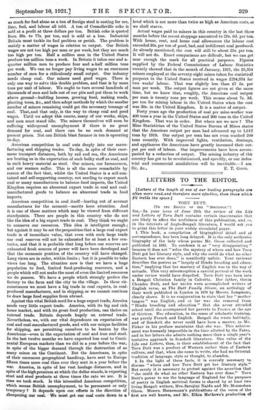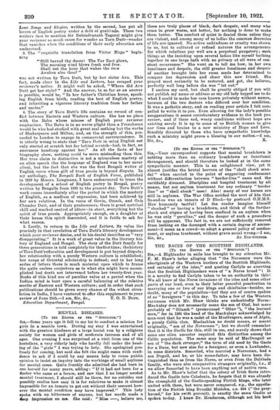LETTERS TO THE EDITOR.
[Letters of the length of one of our leading paragraphs cre often more read,and therefore more effective, than those which fill treble the space.]
TORU DUTT.
[To THE EDITOR OF THE " SPECTATOR."]
SIR,—In your issue of June 25th the review of the Life and Letters of Toru Dutt contains certain inaccuracies that are likely to affect the usefulness of this publication, and so, in the interests of Anglo-Bengali literature, I would ask yea to print this letter in your widely circulated paper.
1. This book, a compilation of biographical detail and of correspondence, has been long delayed. It is the only authentic biography of the lady whose poems Mr. Gesso collected and published in 1882. To condemn it as " very disappointing " because it does not " solve the mystery of where and how Toru Dutt got her literary style, and why she could do what no other Eastern has ever done," is manifestly unfair. Your reviewer describes the poetess as " largely of Hindu breeding and educa- tion," implying that her mastery of English was in the way of miracle. This very misconception a careful perusal of the work under review would have dispelled. Toru Dutt was born into a Bengali Christian family in Calcutta. Her father, Govin Chunder Dutt, and her uncles were accomplished writers of English verse, as The Dutt Family Album, an anthology of their work published in London in 1870 by Messrs. Longmans, clearly shows. It is no exaggeration to state that her " mother tongue" was English, and eo far was she removed from "Hindu breeding and education " that she never attended school until she accompanied her parents to France at the age of thirteen. Her education, in the sense of scholastic training, was purely French and English. Bengali she wrote haltingly, and of Sanskrit she never could have been a master, as Mr. Fisher in his preface maintains that she was. This achieve- ment was humanly impossible in the time allotted by the Fates, and in her letters she admits nothing more than a single year's tentative approach to Sanskrit literature. One value of the Life and Letters, then, is their establishment of the fact that Torn Dntt was a product of Western rather than of Eastern culture, and that, when she came to write, she had no Oriental, tradition of language, style or thought, to abandon.
2. In the light of these facts, it is scarcely necessary to
discuss " where and how Toru Dntt got her literary style." But surely it is necessary to protest against the assertion that "she could do what no other Eastern has ever done." Torn butt's power to use the language of England for the purposes of poetry in English metrical forms is shared by at least two living Bengali writers, Mrs. Sarojini -Naidu and Mr. Monmohan Ghose. Messrs. Heinemann's publications of the verse of the first are well known, and -Mr, Elkin Mathews's production or
Love Songs and Elegies, written by the second, has put all lovers of English poetry under a debt of gratitude. These two writers (not to mention Sir Rabindranath Tagore) might give your reviewer as much cause for wonder as Toru Dutt—wonder that vanishes when the conditions of their early education are understood.
3. The "exquisite translation from Victor Hugo" begin- ning "Still barred thy doors! The Far East glows, The morning wind blows fresh and free.
Shall not the hour that wakes the rose Awaken also thee? "
was not written by Torn Dutt, but by her sister Aru. This fact, made clear in the Life and Letters, has escaped your reviewer's notice. It might well be asked, "Where did Amu Dutt get her style?" And the answer, in so far as an answer is possible, would be, " In her father's Christian home, speak-
ing English from birth, reading the best of English poetry, and inheriting a vigorous literary tradition from her father and uncles."
4. The story of Toru Dutt's life contains no record of con- flict between Eastern and Western culture. She has no place with the Babu whose misuse of English your reviewer emphasizes. The Babu is in no worse plight than a Frenchman would be who had studied with great zeal nothing but the works of Shakespeare and Milton, and, on the strength of this, pro- ceeded to London to engage in commercial correspondence. It is utterly wrong to state that "Toru Dutt in using English not only started at scratch but far behind scratch—had, in fact, an enormous handicap against her." As all the facts of her biography show, nothing could be more misleading than this.
Her true claim to distinction is not a miraculous mastery of
an alien speech (for the language of England was to her never alien), but the fact that she was the first Bengali writer of English verse whose gift of true poesio is beyond dispute. In my anthology, The Bengali Book of English Verse, published in 1919 by Messrs. Longmans, I have endeavoured to trace the
development of a school of English poetry in Bengal, poetry
written by Bengalis from 1835 to the present day. Toru Dutt's -work comes immediately after the period in which the mastery
of English, as a medium of expression, had been achieved by
her own relatives. In the verse of GovM, ()mesh, and Gris Chunder Dutt, and of their predecessors, there is great metrical skill and marked control of idiom—in short, everything but the spirit of true poesie. Appropriately enough, on a daughter of their house this spirit descended, and it is futile to ask for what reason.
5. Lastly, to return to the Life and Letters, its value lies precisely in that revelation of Toru Dutt's literary development which your reviewer denies, and in his denial describes as " very
disappointing." It is a work of great value in the literary his- tory of England and Bengal. The story of the Dutt family for three generations is told completely for theflrst time; thehistory of ToruDutt'seducation and development is put beyond dispute;
her relationship with a purely Western culture is established; her range of Oriental scholarship is defined; and in her long series of letters there is much material upon which to frame the quite useless conjecture as to what she might have accom- plished had death not intervened before her twenty-first year. Books of this kind are of peculiar value at a period when the Indian mind is bent upon a careful balancing of the relative merits of Eastern and Western culture; and in order that such publications should be given every chance of the widest circu- lation in India, I have ventured to offer this supplement to your review of June 25th.—I am, Sir, &c., T. 0. D. Dmils. Education Department, Bengal.



































 Previous page
Previous page